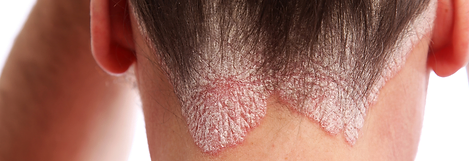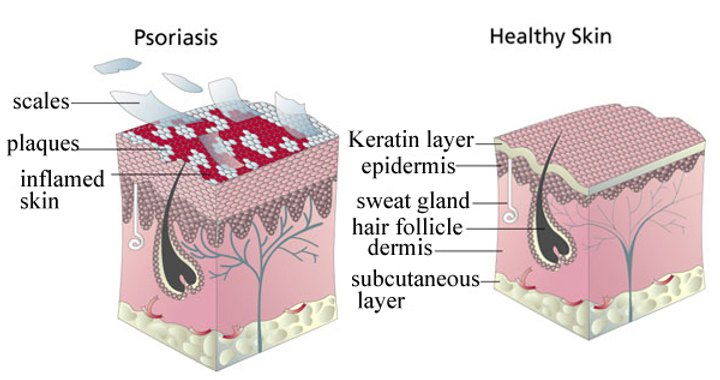Psoriasis

CLINICAL MANIFESTATIONS OF ALLERGY : PSORIASIS
Psoriasis -A disease of body & mind!
Skin, the largest organ of our body does not just have a cosmetic value but also is a medium of expression for internal derangements of health in form of various ailments. These can be simply Boils, Acne, Urticaria or even more chronic ailments like Psoriasis. Studies by National Psoriasis Foundation have observed that psoriasis and psoriatic arthritis are common, life-altering and often debilitating conditions. Psoriasis affects an estimated 2-3 percent of the world’s population and nearly 60 percent reported their disease to be a large problem in their everyday life.
One of the worst parts of having Psoriasis is the way others may avoid you, thinking that psoriasis is contagious or a sign of bad hygiene. It makes a person feel self-conscious, helpless & frustrated. Constant worrying about people’s perceptions and avoiding certain social situations may become a major source of stress in life of the sufferers that, in return has been known to make Psoriasis worse. Fortunately, Homoeopathy has an answer to the menace of this ailment which helps you lead a more confident and normal life like any other healthy individual.
TRIGGERING FACTORS
Infections
The infections known to trigger psoriasis in susceptible individuals are mentioned as follows:
- Candida albicans (thrush)
- Human immunodeficiency virus (HIV)
- Staphylococcal skin infections (boils)
- Streptococcal pharyngitis (streptococcal throat)
- Viral upper respiratory tract infection
Reaction to Certain Medications
Anti-malarial drugs – It has been observed that psoriasis may develop after taking an anti-malarial medication in some persons.
Beta-blockers (medication used to treat high blood pressure) and heart medication – These worsen psoriasis in some people.
Corticosteroids
Non-steroidal medications – used to treat arthritis and other inflammatory conditions may worsen psoriasis in some people.
Lithium – used to treat manic depression and other psychiatric conditions aggravates psoriasis in many persons.
Skin Injury
People with psoriasis often notice new lesions 10 to 14 days after the skin is cut, scratched, rubbed, or severely sunburned. This is called – “Koebner’s phenomenon”. All types of trauma have been associated with the development of psoriasis especially plaque psoriasis (e.g., physical, chemical, electrical, surgical, infective, and inflammatory types of injury). Even excessive scratching can aggravate or precipitate localized psoriasis.
Stress
Although having psoriasis is, in itself, stressful, some people can even trace their first outbreak to a particular stressful event.
Weather
- Winter tends to be the most challenging season for persons suffering from psoriasis. It has been observed that cold weather is a common trigger for many people whereas on the other hand, a hot and sunny climate tends to clear the skin.
- Sunburn on the other hand, can act as a triggering factor for psoriasis.
Hormones
Some of the research studies have shown that the severity of psoriasis may fluctuate with hormonal changes.
- Disease frequency peaks during puberty and menopause.
- When hormone levels increase during pregnancy, symptoms are more likely to improve than worsen. In contrast, symptoms are more likely to flare in the postpartum period, if any changes occur at all.

Others
Smoking, and heavy alcohol consumption appears to trigger psoriasis in some people.
PSORIASIS & ALLERGY
Psoriasis is a chronic skin disease characterized by scaling and inflammation. Normally, skin cells mature and are shed from the skin’s surface every 28 to 30 days. When psoriasis develops, the skin cells mature in 3 to 6 days and move to the skin surface. Instead of being shed, the skin cells pile up, causing the visible lesions. Psoriasis is not contagious and cannot be passed from one person to another, but it is most likely to occur in members of the same family.
INCIDENCE
>Age: Can occur at any age, although it most commonly appears for the first time between the ages of 15 and 25 years.
Sex: It affects both sexes equally.
Race: Psoriasis can affect persons of any race; however, epidemiologic studies have shown a higher prevalence in Western European and Scandinavian populations.
PSORIASIS : A Manifestation of Skin Allergy
Years of research and practice at our clinics has accumulated enough evidence to help us arrive at a hypothesis where Allergy lies at the helm of most of the diseases and Psoriasis is one of them.
Allergy(Greek: allos, other + ergon, work = altered reaction) is an abnormal and individual hypersensitivity to substances that are ordinarily harmless and which results in various types of reactions.
